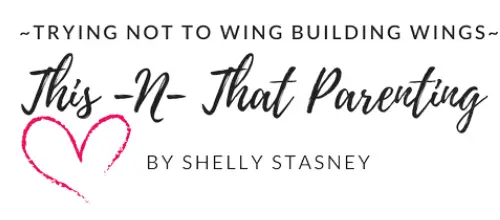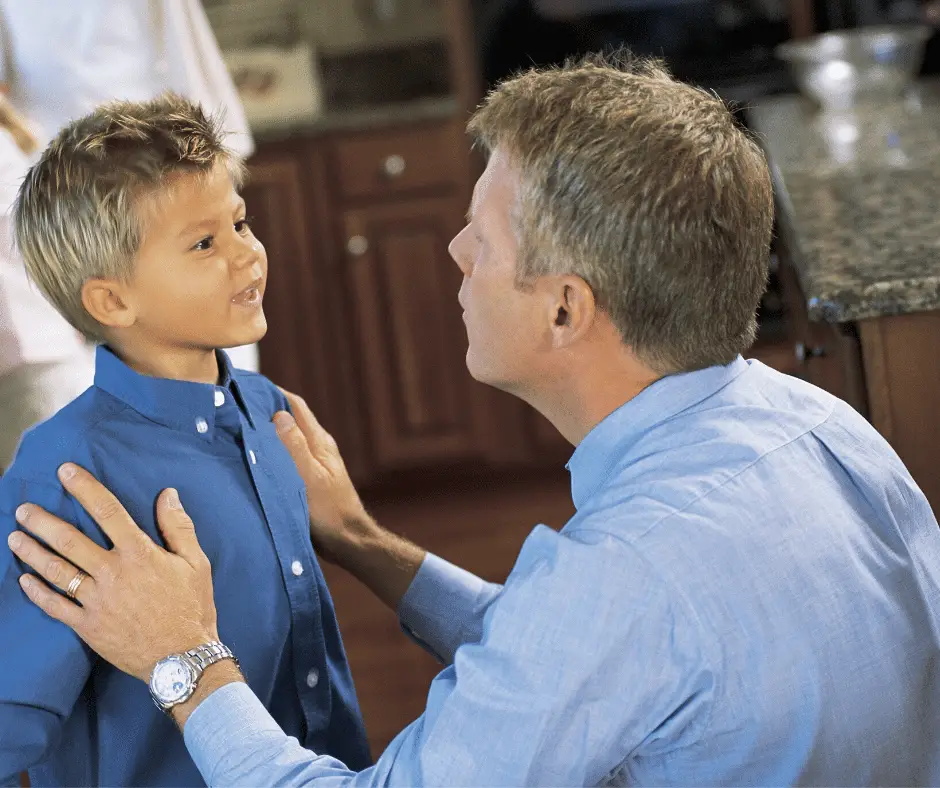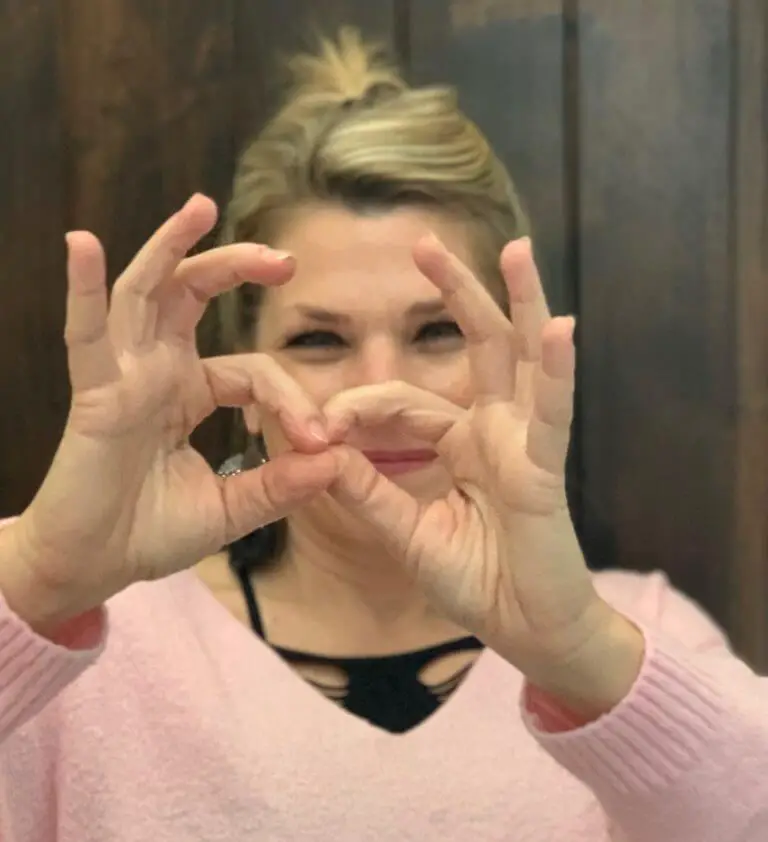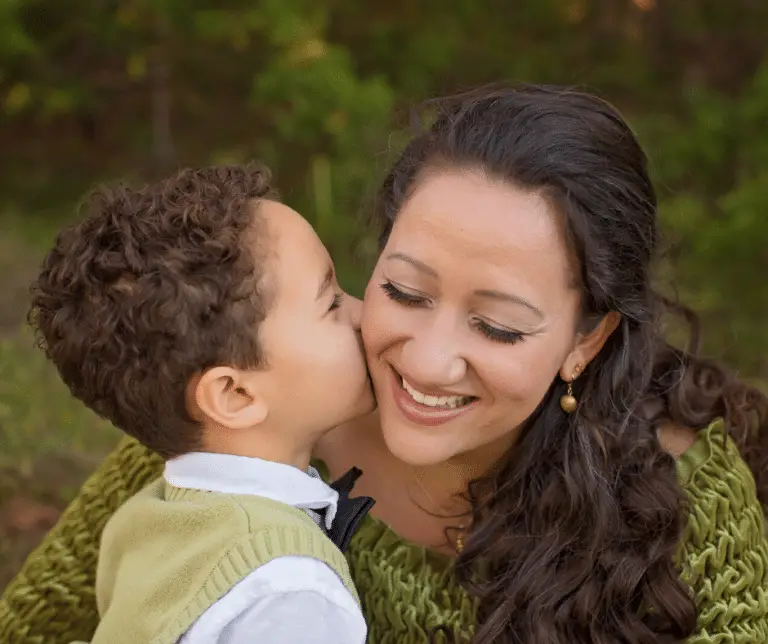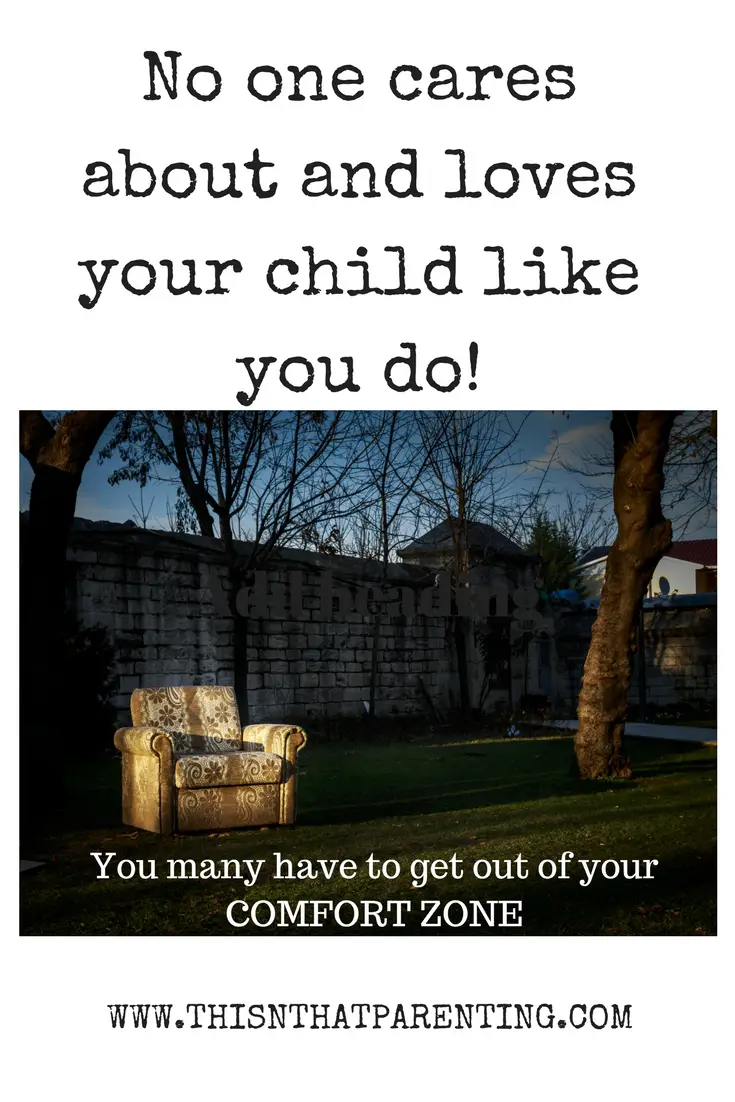The Way We Talk To Our Child Becomes Their Inner Voice
Have you heard Peggy O’Mara’s message, “The way we talk to our child becomes their inner voice.”? The quote is viral on the parenting front. When I first read this, I honestly thought, “Geez, another responsibility.”
I know that our words can’t be taken back. To think that what I say to them daily will be what they hear for the rest of their life seems like a heavy charge. Basically, we can imagine our children walking around with tape recorders in their heads. As they get older, the recordings will be on repeat.
In this article, I’m going to help you understand why it is important for us to be intentional about the way we talk to our children. Then, I will teach you ways to talk to your child that will give you the outcomes you desire.
The Benefits of Being Intentional About The Way We Talk To Our Child
Changing the way we talk to our children takes practice and intentionality. You can’t say you want to talk more positively to your child and wake up the next morning doing it. You have to know some of the languages you want to use with them.
When you realize it’s hard to change your talking patterns, the thing that is going to get you to keep giving your best effort is your why. Why is it a great idea to talk respectfully and positively to our child?
For one, the way we talk to our children is going to influence them for a lifetime. Second, the way we talk to our kids will even have an influence on our grandchildren and generations after that. The way we talk to our children can influence our legacy.
- It builds stronger bonds and relationships.
- Our children feel worthy.
- Our children listen to us better.
- The way we talk to our children becomes their inner voice. (This is enough in and of itself.)
- Your child is more likely to respect and trust you.
- The child develops higher self-esteem.
- The child is more confident.
- Children imitate our talk.
- Our children feel loved.
Think About Your Inner Voice
When you make a mistake, what do you hear your inner voice say? When you do something well, does it cheerlead you?
I remember testing the statement up against my own experience. I’m not sure that all of my self-talk can be chalked up to how my parents talked to me.
I still hear statements from my Drivers Ed teacher while I’m driving. I still hear my coaches’ voice and the things she told us when I’m working out.
My Grandma’s cooking advice still plays out to me in the kitchen. My aunt’s gardening advice comes to me when I am in the flower bed. I hear my favorite librarian at the library.
Equally, my parent’s instructions still play in my head throughout the day as I am encountering life.
It is said that we can be our own worst enemy. This is true. When you get to the bottom of it, the real enemy is our self-talk. Our self-talk comes from what we were exposed to as youngins and continuously exposing ourselves. We are environMENTALLY affected. We want our children to have the most positive self-talk possible.
What is your inner voice like?
Research On The Way We Talk To Our Child
I interviewed family members on the topic, and everyone agreed that they still hear and say to themselves what they heard growing up.
Let it be known. I have taken the time to investigate and test the hypothesis in my own day to day life, and I want to challenge the line.I want to declare that I believe it to be, The Way People Talk to Children Becomes Their Inner Voice. This is one area that I do not believe to be the parent’s sole responsibility. A-n-yone who has contact with children can impact them for the rest of their lives in many areas. In this case, we will stick to self-talk. Think back to how many times you have seen someone on Oprah crying and saying, “He told me…” “She told me I…”
This tells me that not only do we need to be intentional about the way we talk to our child but how others talk to our kids. We can only control ourselves, so our kids will need to be resilient. I want us to focus on how we can be intentional about positively impacting our children with our talk.
One thing we are guaranteed, life is hard. How children perceive the hardness can be positively influenced by us. If we know that the way we talk to our child becomes their inner voice, we can be intentional about planting positive phrases that are supportive during hard times. Statements of positivity and confidence.
Why The Way You Talk To Your Child Matters: A Football Life
Before I had kids, I was in love with a series called A Football Life. I enjoy documentaries and I especially enjoy the organization of the biographies on A Football Life. One of the greatest impacts this show had on me was the confirmation that affirmations and how we talk to our child are worth paying attention to.
In my experience with children, my own or my students, I know that kids do NOT care how much you know until they know how much you care. Once they know how much you care, your words can become GOLD to them. Impactful without a doubt.
What intrigued me most on A Football Life is that players and coaches would be asked what it was that pushed them to exceed like few other humans on Earth do. Time and time again, these men answered that they had a statement that a coach, father, mother, uncle, teacher, or pastor told them when they were young that they held on to. They played the affirmation over and over in their minds throughout the years.
Amazingly, some of the people that impacted these athletes, including some fathers – the players only knew for one day! Some of them, they knew for years. This is another example of the way we talk to our children matters. And when I say OUR child, I mean any of God’s children.
These men spoke of affirmations such as:
- You are only going to be as good as the people you surround yourself with.
- Winners are not people who never fail. They are people who never quit.
- To be a better player than you’ve ever been, you have to do something you’ve never done.
- Stop making excuses and start making things happen.
- Don’t aspire to be the best on the team. Aspire to be the best for the team.
- Don’t let a win get to your head or a loss get to your heart.
Over the years that I watched the show, the men would speak of unimaginable struggles and pain. They would go on to mention how these affirmations carried them through these times. They believed the repetition of these statements was one of the main influencers of their success. These stories gave me confirmation that kids need affirmations.
I have taught my boys affirmations, and it has amazed me how they use them. Even at 2 and 5 years old, a child knows when to use:
- Winners never quit. Quitters never win.
- Anything worth doing is worth doing badly until you get it right.
- If your mouth is open, you’re not listening.
- It’s not what happens to you in life, but how you react to it that matters.
Why are positive affirmations so important during childhood?
On Planet of Success, Steve Mueller says,
Research has shown that we all learn our belief systems as little children. It is the very belief system that functions as the foundation of our entire life. This means that adults move through life trying to experience situations that match their beliefs learned from childhood.
But it also means that we are often bound to the limiting beliefs learned during childhood. We can attribute these negative thought patterns to childhood conditioning or unconsciously picking up negative beliefs.
For this very reason, it is so important to help your children establish a supportive belief system showing them a positive attitude to life. By doing so we can help our children to internalize good values and positive beliefs, which allows them to develop confidence and a healthy dose of self-esteem.
As you can see, parents have the power to positively influence how a child perceives the world. I urge you to be intentional about using affirmations with your child. In my experience of using affirmations, children don’t have to have a ton of affirmations memorized, just a few key affirmations to rely on.
I research affirmations according to areas I see my children needing intervention such as perseverance, self-confidence, fear of failure – whatever comes up. I present the affirmation, have them repeat it, and I continue to use it often until I have confirmation that they own it. You will know the affirmation is theirs when you hear them saying it to themselves and to others.
Sample Language For The Way We Talk to Our Child
#1. When a child is angry
Instead of: How dare you talk like that to me?
Try: I can tell how angry you are.
#2. When a child is not listening
Instead of: I am only going to say this one more time, and then…
Try: (Walking over to the child) Son, I need you to get your shoes on now. We are leaving in 5 minutes.
#3. When a child is crying
Instead of: Stop crying!
Try: You are having big feelings. I am here for you. (Hug or hold the child depending on age.)
#4. When the child takes a toy
Instead of: Don’t just take that toy from your brother. Ya’ll share.
Try: If you want to use the toy your brother is playing with, you need to say, “Can I use that when you are done?” Now give it back to your brother and ask him if you can use it when he’s done.
#5. When a child is loud
Instead of: Quit screaming in the house!
Try: Use your inside voice, please. That volume is for the outdoors.
#6. When a child spills something
Instead of: Could you be more careful? Look at this mess.
Try: The milk is spilled. Let me get you some paper towels to clean it up.
#7. When a child writes on the wall
Instead of: Why are you being so bad? You can’t use crayons anymore.
Try: You use crayons to color on paper. Let me get you some paper so you can practice.
#8. When a child gets hurt
Instead of: Quit crying and be a big boy.
Try: Yes, it hurts when you bump your head.
#9. When a child keeps asking about something
Instead of: I said NO 100 times. Now quit asking!
Try: You have had your hour of screentime. That seems to be disappointing for you. What can you do next?
#10. When there is unacceptable behavior in the car
Instead of: Don’t make me pull this car over!
Try: I pulled over because I can’t drive safely while distracted. I’m not driving again until it’s safe. How can we solve this?
Related Article: 25 Genius Ideas To Tell Your Child Instead Of, “Stop Crying!”
Related Article: Become A Yes Parent: 5 Simple Ways To Say Yes More Often
As you can see, it is not hard to alter the way we talk to our child so long as you are intentional. After all, bad behavior does not mean bad child.
Call To Action
I share 50 affirmations that I have learned over the years that have pushed me, my students, and my children to accomplish tasks or change behaviors and thinking patterns that likely would have become permanent.
Print the PDF, 50 Affirmations to Positively Impact a Child’s Inner Voice, and use it with your own family. I do not mean for you to have your child memorize all 50. The list is meant to be a springboard for your family to choose the affirmations that they need and use to their benefit.
If your children are old enough, let them choose their own affirmations. Have them make cards and posters and decorate them.
You can simply Google: Affirmations for (insert struggle here) if your children struggle with a topic I don’t cover on the list. You will have plenty of choices. If this is something you have not tried, I encourage you to give it a go. I believe you will be inspired by the results.
If we use affirmations and are intentional about the way we talk to our children, our children will have this positive self-talk when they are adults. The way we talk to our children is worth the effort.
Comment:
I’d love for you to share how you use affirmations or tell us how the talk from your childhood has impacted your inner voice in adulthood. Please share how you’ve been inspired to be intentional about the way we talk to our child.
Want More On Connection?
- Become A YES Parent. 5 Simple Ways To Say YES More Often
- The Impact Of The Way We Talk To Our Child Is Mind-Blowing
- 5 Habits To Ensure You Keep Your Word With Your Child
- The Art Of Being A Present Parent
- 10 Smart Ways To Give Your Child Choices And The Benefits
- Children Will Never Forget How You Made Them Feel
- 8 Shocking Truths About Teenage Brain Development Every Parent Must Know
- Self-Fulfilling Prophecy: Children Will Become What You Say They Are
- A Family That Laughs Together Stays Together- 100 Jokes To Make Your Kids Laugh
- The Importance Of Creating I Love You Signals For Your Children
- Do You Have Shiny Parenting Syndrome? Find The Cure Here!
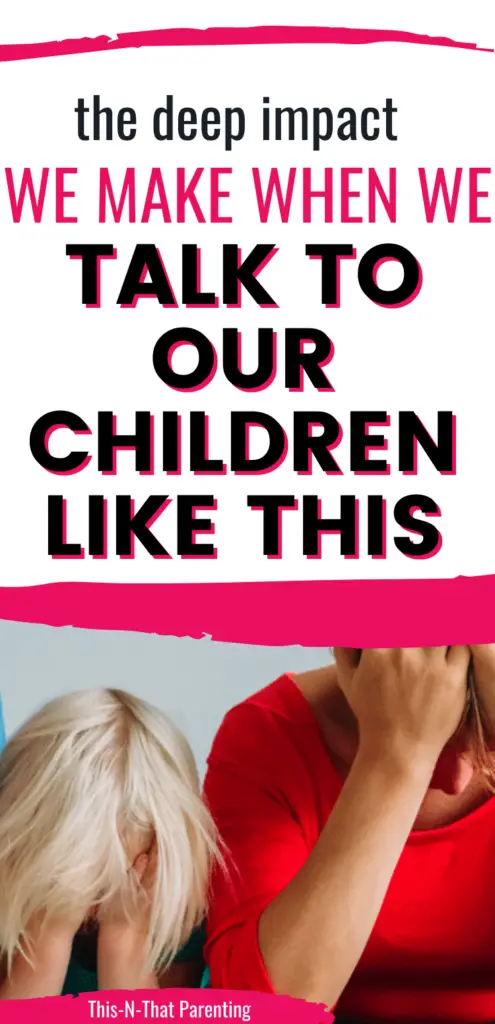
Make it a great day or not, the choice is yours! Remember to have fun, laugh and give God the glory! I love you! SS
